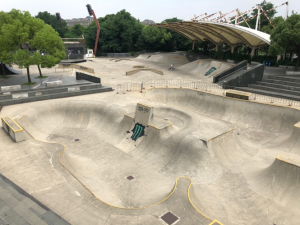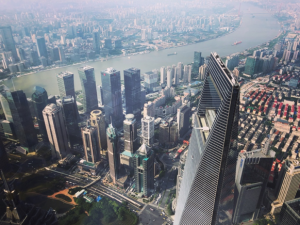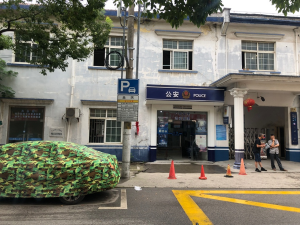What do you study at King’s?
MSc Emerging Economies and International Development.
Where did your Global Summer Experience take place?
Shanghai Jiao Tong University, China.

What course did you take and why?
China’s Policy on Climate Change, Energy and Environment because of the unique interdisciplinary nature of the course on offer.

How did receiving the Global Summer Exchange Award shape your experience?
Being a self-funded part-time student, I have often found it difficult to attend activities outside of class due to time and money constraints. The award contributed to paying for pretty much the entire cost of my return tickets, which of course was a massive help. As the airfare was accounted for, I was able to stay in the country for longer and go to the largest skatepark in the world (SMP Shanghai) to fulfill the dream I have had for many years of riding the masterpiece.

How was the application process?
The application process was straight forward as the initial application was submitted to King’s and then I was nominated to apply to Jiao Tong. The Global Mobility Team go above and beyond to support your application at the host university as the team have a wealth of experience in dealing with global applications.
What were the highlights of your Global Summer Experience?
The opportunity to study alongside a group of like minded cosmopolitan individuals from such a diverse array of fields including environmental science, geography and economics definitely made the in-class discussions a lot more interesting as there was an assimilation of knowledge from the hard and social sciences taking place throughout the course. It was very refreshing to grasp some engineering concepts and solutions to the environmental problems we are facing today. Additionally, the wisdom of Dr. Junhua Zhang made the experience unforgettable.

What was the biggest challenge you encountered during your Global Summer Experience?
The biggest challenge I encountered was a problem with my accommodation situation. I booked a place on AirBnB, which FYI is blocked on China’s firewall, to later be told by Jiao Tong that I must report to the local police station details of my whereabouts for the duration of my stay within 24 hours (a requirement when staying off campus). This is a statutory requirement when on a student visa that I was unaware of and subsequently led to a very nerve-wracking day of tracking down landlords, signing document and contemplating my fear of spending the rest of my days in Chinese detention if this wasn’t boxed off. Luckily, I was able to get the documents to the relevant authorities in time. The lesson was learnt. Ignorance is no excuse; you must respect the laws of the land you are in and conform to any bureaucracy or formalities expected of a visitor. I made this mistake so you as the reader does not have to!

Any other surprises?
Prior to departure I was aware of the mobile payment giants such as WeChat and Alipay, but I completely underestimated their usage among the population. It soon became apparent that QR codes are ubiquitous to the core function of the modern Chinese economy as they are used for things ranging from payments, to unlocking a motorbike and even when you sign up to WeChat you will get your own personalised QR code for new friends to scan, rendering any prior language miscommunication obsolete as you can now communicate through the comfort of a translating app.
Do you have any advice for those thinking of applying?
Go for it. If you are curious, open-minded and intrigued to learn Chinese ways of thinking and problem solving, you should not hold back. It was an experience that has inspired me greatly and it will continue to do so for the rest of my life. If you are not so interested in academia, China also has incredible rice and bakery treats.

